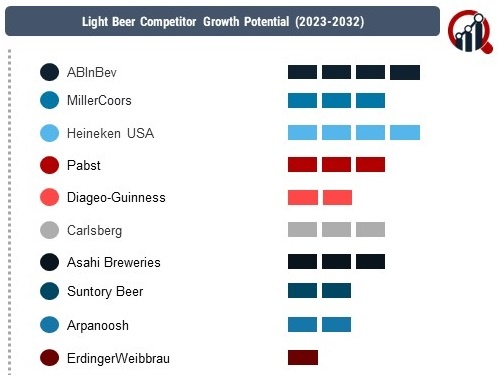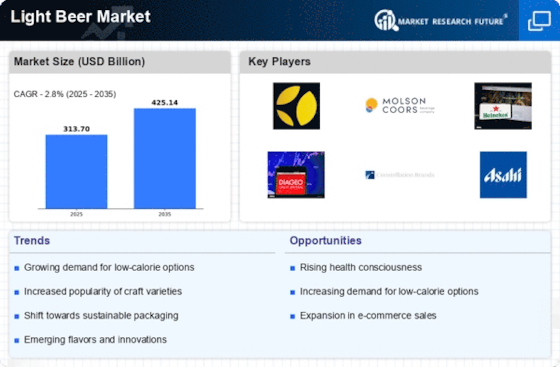Top Industry Leaders in the Light Beer Market

Strategies Adopted by Light Beer Key Players
The light beer market is a dynamic sector characterized by intense competition among key players striving to capture market share and sustain growth. Here's an overview of the competitive landscape, including key players, strategies adopted, market share analysis factors, emerging companies, industry news, current investment trends, and recent developments in 2023.
Key Players:
- ABInBev
- MillerCoors
- Heineken USA
- Pabst
- Diageo-Guinness
- Carlsberg
- Asahi Breweries
- Suntory Beer
- Arpanoosh
- ErdingerWeibbrau
To stay competitive, key players employ various strategies such as product innovation, strategic partnerships, mergers and acquisitions, and aggressive marketing campaigns. Product innovation involves introducing new flavors, packaging sizes, and formulations to cater to evolving consumer preferences. Strategic partnerships and acquisitions enable companies to expand their geographic reach, access new markets, and diversify their product offerings.
Factors for Market Share Analysis:
Market share analysis in the light beer segment considers factors like brand strength, distribution channels, pricing strategies, consumer demographics, and regional presence. Companies with strong brand recognition, efficient distribution networks, and competitive pricing tend to capture larger market shares. Understanding consumer preferences and adapting marketing strategies accordingly also plays a crucial role in gaining market dominance.
News and Emerging Companies:
Emerging companies in the light beer market are focusing on niche segments such as craft light beers, organic offerings, and innovative brewing techniques to differentiate themselves. Additionally, news surrounding sustainability efforts, such as ecofriendly packaging and sourcing of ingredients, is gaining traction among consumers. Some emerging players to watch include craft breweries like Dogfish Head Brewery, Sierra Nevada Brewing Co., and Stone Brewing.
Industry News and Current Investment Trends:
In recent years, the light beer market has witnessed increased investment in sustainable practices, digital marketing initiatives, and product diversification. Companies are investing in research and development to create healthier, more environmentally friendly brewing methods and ingredients. Additionally, digital marketing campaigns leveraging social media platforms and influencer partnerships are becoming prevalent to engage with consumers effectively.
Overall Competitive Scenario:
The competitive landscape of the light beer market is characterized by robust competition among established players and the emergence of innovative newcomers. While multinational corporations dominate the market with their extensive resources and distribution networks, craft breweries and niche players are carving out their own space by appealing to discerning consumers seeking unique flavor profiles and artisanal offerings. The market dynamics continue to evolve as companies adapt to changing consumer preferences and regulatory requirements.
Recent Development in 2023:
In 2023, major players in the light beer market focused on sustainability initiatives and product diversification to maintain their competitive edge. AnheuserBusch InBev announced plans to invest in renewable energy sources and reduce carbon emissions across its global operations. Molson Coors Brewing Company introduced a new line of organic light beers to cater to the growing demand for natural and ecofriendly products. Meanwhile, craft breweries like Sierra Nevada Brewing Co. launched limitededition light beer variants infused with exotic ingredients to appeal to adventurous consumers. These developments underscore the industry's commitment to innovation and sustainability while addressing evolving consumer preferences.











